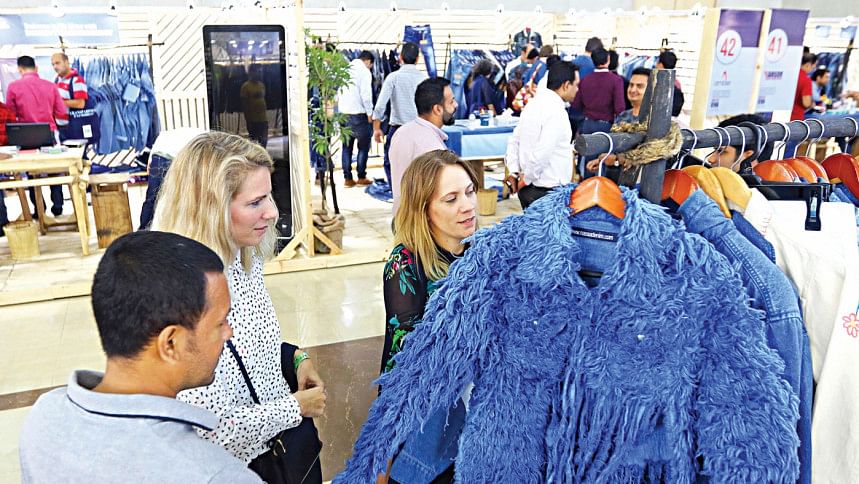Withdraw export threshold in new GSP

Garment exporters are demanding the European Union (EU) remove the 7.4 per cent threshold on apparel imports from any given country in the proposed Generalised System of Preferences (GSP) to ensure smooth continuation of exports to the world's largest trade bloc.
In the new 10-year GSP scheme, which is going to be effective from 2024 onwards, the EU added a clause that if the value of garment imports from a country eligible for duty-free benefits under the Everything But Arms initiative crosses 7.4 per cent of the bloc's total apparel imports, then the zero-duty facility will not be applicable even if GSP status is granted.
The total value of apparel items exported from Bangladesh to EU countries has already gone past the threshold and now stands at more than 9.74 per cent considering the export value of 2019.
EU member states bought clothes worth 154 billion euros from outside the bloc with Bangladesh accounting for 15 billion euros that year, according to data from the Export Promotion Bureau (EPB).
Leaders of the Bangladesh Garment Manufacturers and Exporters Association (BGMEA) and Bangladesh Knitwear Manufacturers and Exporters Association (BKMEA) also demanded an extension of the transition period, when Bangladesh can still enjoy duty benefits as a least developed country, after the country's graduation in 2026.
As the EU usually allots a three-year transition period, Bangladesh will be able to avail the trade benefits up till 2029 under the current agreement.
"We made this demand in the face of different challenged, like the Covid-19 fallout, Russia-Ukraine war and high global inflation," said Faruque Hassan, president of the BGMEA.
"So, it would be better if the EU extends the trade benefits up till 2032," he told The Daily Star after meeting with the visiting EU trade delegation at the BGMEA office in Gulshan, Dhaka yesterday.
Garment exporters present at the meeting urged for ensuring fair prices from EU retailers and brands to make the local garment industry more sustainable.
In response, the EU delegation and association leaders said they would follow the government's roadmap in applying labour laws, which are going to be reformed in consultation with the EU.
The EU has been pressuring the government to amend the labour law and bring Export Processing Zones (EPZ) under uniform regulations in order to enjoy the EU trade benefit under the new GSP scheme.
BGMEA and BKMEA leaders highlighted the progress made in workplace safety as well as the industry's gradual adoption of green manufacturing practices to protect the environment.
MA Razzaque, research director of the Policy Research Institute of Bangladesh, said the specified EU "safeguards" would exclude the country's clothing exports from any tariff preferences.
"The proposed GSP has removed the import share criterion, which stipulated that a country's share in EU GSP-covered imports in 2019 can't be more than 7.4 per cent," he added.
So, if the proposed rules remain unchanged, the average tariff on apparel exports from Bangladesh to the EU will rise from the currently zero to an average of 12 per cent, according to Razzaque.
The new proposals will be finalised when adopted by the European Parliament and the European Commission, the executive branch of the EU, potentially in the last quarter of 2022.
"So, Bangladesh needs to negotiate further with the EU to change the current draft of the GSP regulation because if this draft is passed, local garment items will have very less chance of enjoying the zero-duty benefit," Razzaque said.
Commerce Minister Tipu Munshi on different occasions also requested the EU to remove the threshold from proposed GSP scheme.
Mohammad Hatem, executive president of the BKMEA, said the EU delegation promised they would remove the threshold from the proposed GSP as the scope exists until it is passed in parliament.
Hatem then informed that the EU delegation said Bangladesh could go for signing a free trade agreement with the EU in the future.
The six member EU trade committee led by Heidi Hautala is scheduled to hold discussions with secretaries of the commerce, labour and foreign ministries to assess the country's labour and human rights and the workplace safety issues at a meeting to be held at the Foreign Service Academy in Dhaka, said Abdur Rahim Khan, additional secretary to the commerce ministry.
In March this year, another EU delegation also expressed concerns over the delay in amendments to the labour law as the EU wants uniform labour laws for workers both inside and outside of EPZs.
The EPZ labour law was supposed to be amended by December last year.
"The vetting of the draft of the amendable labour law is almost completed and very soon it will be sent to the parliament for making it as a law," Khan said.
Bangladesh's garment exports to the EU, the largest apparel importer in the world, increased by 33.87 per cent to $21.04 billion in FY21-22 from $15.99 billion in FY20-21, EPB data showed.

 For all latest news, follow The Daily Star's Google News channel.
For all latest news, follow The Daily Star's Google News channel. 



Comments